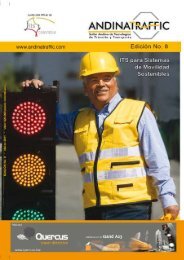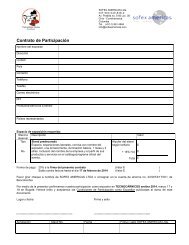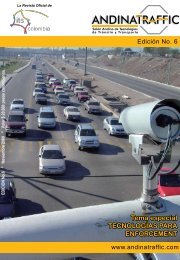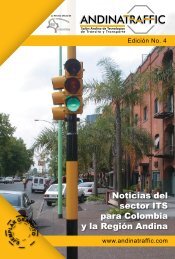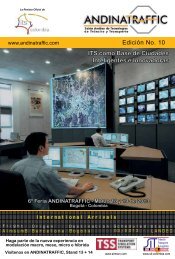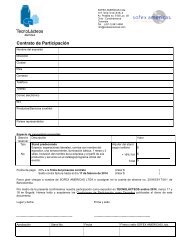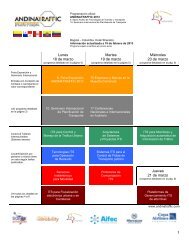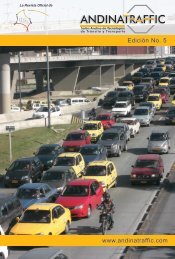Edición No. 9 - Andinatraffic
Edición No. 9 - Andinatraffic
Edición No. 9 - Andinatraffic
Create successful ePaper yourself
Turn your PDF publications into a flip-book with our unique Google optimized e-Paper software.
ANDINATRAFFIC - EDICION <strong>No</strong>. 9<br />
level, so only fare products according<br />
to every profile should<br />
be loaded. AFC Central System<br />
will verify that only one card has<br />
been distributed to each customer,<br />
and confirm identification<br />
of the card and the customer<br />
profile entitling the purchaser to<br />
discounted tickets.<br />
In order to allow sales or validation<br />
discounts, some information<br />
related to the owner profile<br />
should be included in the contact-less<br />
cards. For example:<br />
• Patron profile: For instance:<br />
• Regular<br />
• Student<br />
• Pensioner<br />
• Mobility impairment<br />
• Unemployed<br />
• Bicycle<br />
• Patron profile validity period<br />
(e.g. start and end of validity<br />
date)<br />
All different profiles will be<br />
defined in the detailed Design<br />
Specification Phase of the Project..<br />
2.2 Types of fare products<br />
According to the Automatic Fare<br />
Collection Specifications HHR-<br />
LO-AF-403-SYS-001-D1’), at the<br />
beginning of the operation phase,<br />
24<br />
two types of tickets will be used<br />
in the system: single journey tickets<br />
(one trip between origin and<br />
destination stations) and stored<br />
value tickets (fare calculated<br />
at the exit gate and withdrawn<br />
from the value stored within the<br />
card).<br />
Nevertheless, due to the strongly<br />
parameter-based structure of<br />
the fare products information<br />
contained in the fare media, the<br />
AFC system will be very powerful<br />
allowing the definition of a<br />
complex set of fare products.<br />
In addition to the parameters<br />
mentioned above, the system<br />
will contain fare product information<br />
as:<br />
• Type of ticket (stored value,<br />
pass, stored ride …)<br />
• Type of discount: For instance:<br />
• One trip or a fixed value<br />
• Profile depending<br />
• Peak or non-peak depending<br />
• Type of day (e.g. weekend) depending<br />
• Zone depending<br />
• Multi-passenger available<br />
• Anti-passback activated (a settable<br />
period of time after validation<br />
during which a card can<br />
not be used for accessing the<br />
paid area. It is usually associat-<br />
ed to personal passes in order<br />
to avoid multi-usage)<br />
• Transfer allowed<br />
• Using all these parameters,<br />
many different fare tickets<br />
could be defined. From simple<br />
fare products like ‘all zones<br />
multi-trip multi-passenger ticket’<br />
or ‘all zones monthly pass’<br />
to some quite more complex<br />
like ‘value, plus multi-passenger<br />
plus for one zone only, plus<br />
non-peak only, plus not valid in<br />
weekends’, etc.).<br />
In contact-less cards, it shall be<br />
possible to combine up to four<br />
fare products in the same card.<br />
Anyway, precise rules shall be<br />
defined at Detailed Specification<br />
Phase in order to clarify all<br />
co-existence conditions and to<br />
avoid conflicts between different<br />
fare products. The validators will<br />
then have the capacity to automatically<br />
choose the best option<br />
for the passenger. The passenger<br />
will be informed of the chosen<br />
option.<br />
Some other type of cards and<br />
tickets will be developed for different<br />
purposes: For instance:<br />
• Testing cards and tickets<br />
• V.I.P. passes



